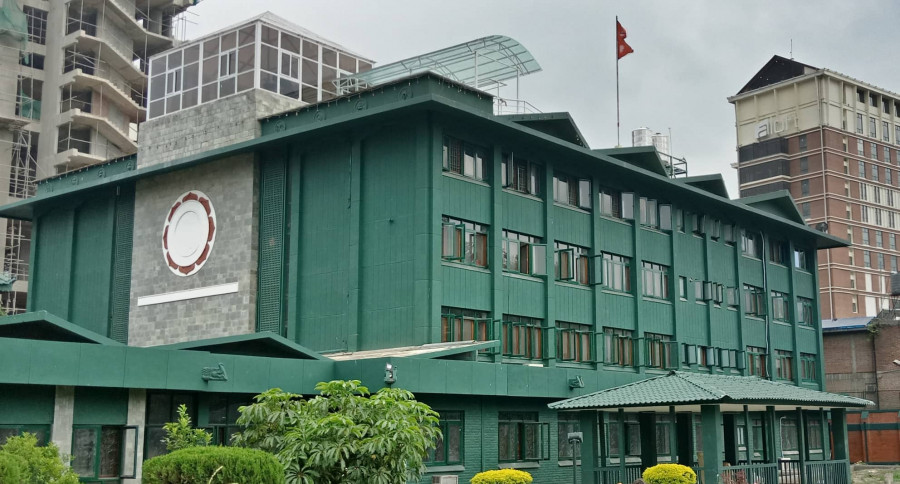
Office of Vice President. Photo Courtesy: Umesh Das Lal/Google Maps
With the country recently getting its third President, all eyes are now on the election for Vice President scheduled for March 17.
The position, however, is largely cosmetic, with the Vice President given no special duty by the constitution. Yet the political parties are still battling for it.
The Election Commission on Sunday published the final list of candidates for the vice-presidential election. It includes Asta Laxmi Shakya from the CPN-UML, Pramila Yadav and Ram Sahaya Prasad Yadav from the Janata Samajbadi Party, and Mamta Jha from the Janamat Party.
The ruling coalition has failed to settle on a common candidate. And none of the parties is in the mood to withdraw its candidate, even though the ruling coalition is in negotiations to agree on a common candidate.
Observers said even the powerless position has eventually turned into a major bone of contention in power-sharing negotiations. Former Speaker Damannath Dhungana said key politicians have been zealously appointing their confidants in constitutional positions. “There is an unhealthy competition between them in such appointments. Little do they care about the post’s sanctity,” he said.
Political analyst Mumaram Khanal sees two reasons why political parties and leaders are putting such efforts to secure the position. “One, they see it as a suitable position to ensure a senior leader’s graceful exit from party politics. It is, in many cases, the last state position for an influential leader. Two, it has become one more position—like ministers, Speaker and President—that is up for discussion during power-sharing negotiations,” Khanal told the Post.
The run-up to the vice-presidential election has already witnessed tussles between the leaders and parties.
UML lawmaker Mahesh Bartaula, who had seconded the candidacy of Ashta Laxmi Shakya, and Mamata Jha, a vice-presidential candidate from the Janamat Party, had lodged complaints at the Office of the Election Officer against Ram Sahay Prasad Yadav.
On Friday, top election officials had said only women from communities other than Khas-Arya could be candidates for Vice President. Chief Election Commissioner Dinesh Thapaliya had claimed that the election body would accept nominations of only female candidates from Dalit, Indigenous Nationalities, Muslim, Madheshi or Tharu communities.
But the election officer on Sunday decided to quash two complaints against Yadav, concluding that law doesn’t require the President and the Vice President to be from different genders.
Article 70 of the constitution states that “election to the President and the Vice President under this constitution shall be so made as to have representation of different sex or community.”
For political analyst Chandra Dev Bhatta, the priority of the political parties has been to appoint their leaders to a position of benefit with no apparent responsibilities as a reward, and this tendency has undermined the esteem of the position. “They have been interpreting the constitution as they like,” he said.
“The political parties have been interpreting the constitutional provisions as they please and fielding candidates and lodging complaints against each other. It has turned into yet another power game,” said Khim Lal Devkota, member of the National Assembly.
The vice-presidential election has even brought about a division in Madhesh-based parties.
The Janata Samajbadi Party, the Loktantrik Samajbadi Party, and the Janamat Party have fielded their candidates for the post. Ranjita Shrestha from the Nagarik Unmukti Party, despite filing her candidacy, was later deemed ineligible to run as she could not meet the age requirement since a candidate for Vice President should be at least 45.
The Janamat, the Loktantrik Samajbadi and the Nagarik Unmukti have already forged a working alliance to elect Mamata Jha.
Now, it is apparently the Janata Samajbadi Party (especially Upendra Yadav) versus other regional parties.
As parties are mostly focused on getting the position, concerns about its futility have been ignored. Even former Vice President Parmananda Jha has said that the position of the Vice President is largely “useless”.
Article 67 of the Constitution of Nepal 2015 says: “There shall be a Vice President of Nepal.” Sub Article (2) says the functions to be performed by the President shall be performed by the Vice President during the absence of the President.
But even when the previous presidents went abroad, they did not delegate their responsibilities like endorsing a vital pending bill in the parliament to the Vice President.
Experts suggest that the Vice President should be the upper house chair. Former Speaker Dhungana stressed that even though the role of the Vice President is limited, it would be wrong to either keep the post vacant or to render it roleless. “One way to do that would be to make the Vice President the upper house chair.”
Devkota said it is high time the role of the Vice President is redefined and made relevant. “It is best to reduce state expenses by making the Vice President an ex-officio chair of the upper house.”












